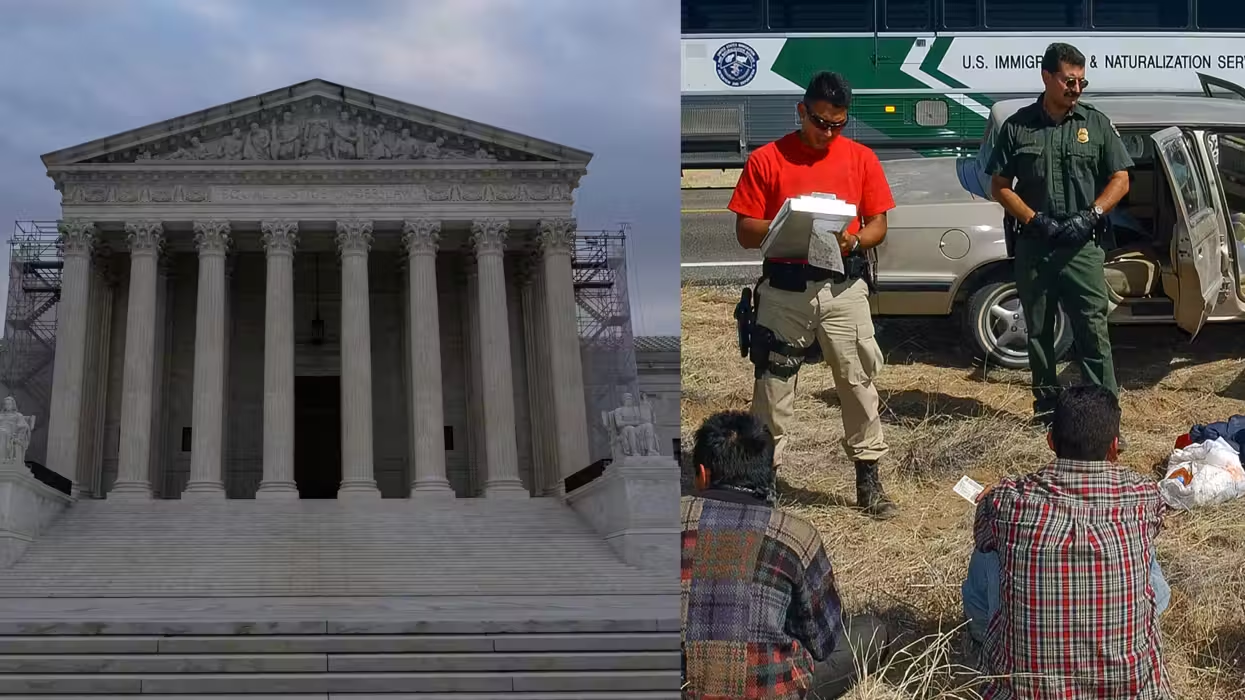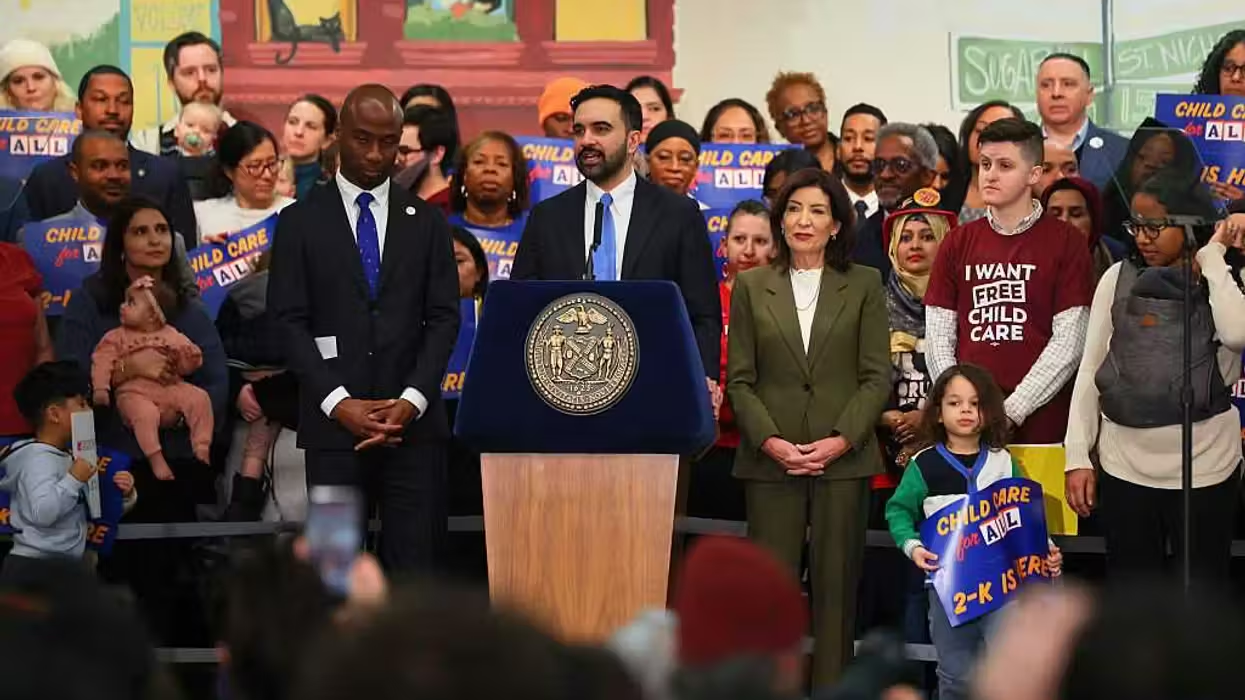
© 2026 Blaze Media LLC. All rights reserved.
Where does the Constitution say that California judges control our border policy?
April 09, 2019
How much longer will we allow the inmates to run the asylum?
The Supreme Court only heard 60 cases last year. Meanwhile, the lower courts heard tens of thousands of cases, and their dockets are full of every political issue under the sun. If we are going to agree as a society that the judiciary now controls every political issue, including issues fundamental to our sovereignty, foreign policy, and national security, that essentially means that foreign invaders and smugglers and cartels control our destiny, regardless of who we elect as president or to Congress. Why? Because of California judges.
Late yesterday, Richard Seeborg, an Obama-appointed federal judge in the Northern District of California, issued a nationwide injunction on the administration’s pilot program for processing credible fear claims in Mexico, known as Migration Protection Protocols.
Rather than categorically suspending immigration requests at the border, the DHS issued a regulation in December to continue such claims but to have some of the illegal aliens wait in Mexico pending the outcome of the proceedings. As I’ve noted, statute is clear that the same way the president can suspend all entry, he can place partial restrictions or conditions on such entry, a point made by Chief Justice John Roberts himself last year in Trump v. Hawaii. But lower courts are always able to write orders more liberal than recent Supreme Court precedent.
Judges cannot empower foreign nationals to sue for a right to enter
The judicial power vested in a judge allows him to grant injunctive relief to an American seeking protection from a regulatory burden or criminal prosecution. Thus a judge can say he will not agree to punish a winning plaintiff even if an executive policy or legislative statute required it. That is judicial review.
A judge, however, has no such power to “issue an injunction” to enable foreign nationals to come into our country without permission of the president. This judge’s ruling is as valid as an injunction placed by me on an administrative policy. Courts simply lack such power and have no power to enforce these political musings, exactly as Alexander Hamilton had in mind when discussing the lack of concern for judicial power grabs.
It’s amusing to watch people treat Wong Kim Ark, the birthright citizenship Supreme Court case, as sacred (even though it explicitly bars illegal aliens from birthright citizenship), yet they never heed the words of its author, Justice Horace Gray, in an opinion six years earlier:
It is not within the province of the judiciary to order that foreigners who have never been naturalized, nor acquired any domicile or residence within the United States, nor even been admitted into the country pursuant to law, shall be permitted to enter, in opposition to the constitutional and lawful measures of the legislative and executive branches of the national government. As to such persons, the decisions of executive or administrative officers, acting within powers expressly conferred by Congress, are due process of law. Nishimura Ekiu v. United States, 1892.
This is not just ancient history. The high court said the same thing even in 1982, after we passed all of our current immigration statutes. “An alien seeking initial admission to the United States requests a privilege and has no constitutional rights regarding his application.” Landon v. Plasencia, 1982.
In his new ruling, Judge Seeborg noted, “To be clear, the issue in this case is not whether it would be permissible for Congress to authorize DHS to return aliens to Mexico pending final determinations as to their admissibility.” That, of course, is a political question “for the political branches of government to make, implement, and enforce,” concedes this confused judge. However, he then proceeds to use the time-tested trick of saying he doesn’t like how Trump did it.
Additionally, sensing the tenuous case of a district judge issuing an injunction outside of the case and outside his geographic jurisdiction, Seeborg said that “defendants have not shown the injunction in this case can be limited geographically. This is not a case implicating local concerns or values.” Thus, because he feels it’s not feasible to follow the Constitution and actually issue judgment only to plaintiffs, this wayward judge simply violates the separation of powers.
He justifies the practice particularly for immigration because courts have “consistently recognized the authority of district courts to enjoin unlawful policies on a universal basis.” But he never cites a Supreme Court opinion and only cites Ninth Circuit cases that are brand-new! Thus, judges violate rules of standing and precedent for getting involved in border matters, and then, once they do so a few times unchallenged by this administration a few times, they cite similar modern judges as precedent!
Of course, nowhere in this opinion does the judge even address the emphatic language of 212(f) and 215(a) of the INA granting the president unlimited authority to do this in the plainest language. Nowhere does the judge cite Trump v. Hawaii or Sale (1993), in which the Supreme Court said 180 degrees the opposite. In fact, the judge cites the Ninth Circuit case that the Supreme Court reversed!
California judges and drug cartels control our sovereignty
Are we resigned to a destiny where cartels can determine who comes into the country and have California judges override the law? If a single progressive judge is vested with the power to override sovereignty and law, even when the Supreme Court just said the opposite, then there is no representative republic left.
Here’s a partial list of California judges ruling over the most sensitive national and even international issues:
- Dolly Gee of the Central District of California, among many other radical opinions overturned by SCOTUS over the years, said the administration must release all children after 20 days, even though the Flores settlement is outdated and statute downright requires the opposite.
- Dana Sabraw of the Southern District of California said that parents must be released with children too, thereby ruling on a political argument of the media’s virtue-signaling, when laws were not only written but updated in 1996 to explicitly close this loophole.
- Judge William Alsup of the Northern District of California ruled that Obama’s amnesty must remain for now, in violation of every immigration law on the books.
- Judge Jon Tigar of the Northern District of California, just like Seeborg, ruled that the administration can’t make a simple commonsense regulation of driving credible fear claims to points of entry, even though 215(a) of the INA states that “it shall be unlawful for any alien to depart from or enter or attempt to depart from or enter the United States except under such reasonable rules, regulations, and orders, and subject to such limitations and exceptions as the President may prescribe.”
- Judge Edward Chen of the Northern District of California ruled that Temporary Protected Status, rather than being temporary and discretionary, is permanent and mandatory for Trump because he supposedly has “animus against non-white, non-European immigrants in violation of Equal Protection guaranteed by the Constitution.” This after the Supreme Court said explicitly that such political statements cannot be used and after Congress barred the courts from hearing this very case!
The president has powers over entry into the country without judicial review
Seeborg and Tigar sit on the U.S. District Court for the Northern District of California. This is the very court that said in 1996 that the “exclusion of aliens is a fundamental act of sovereignty” and that “the right to do so stems not alone from legislative power but is inherent in the executive power to control the foreign affairs of the nation. (Encuentro del Canto Popular v. Christopher, N.D. Cal. 1996).
Indeed, Congress has historically granted the executive branch broad latitude to defend sovereignty, more than on any other issue. As immigration historian Peter H. Schuck wrote in his scholarly book, Citizens, Strangers, and In-Betweens:
Congress has chosen to confer exceedingly broad discretion over the most far-reaching immigration decisions not merely to the executive branch, but to a cabinet official. … In the face of broad, express congressional delegations of authority to the president in the area of external relations, judicial power is the most problematic and the President’s authority, in Justice Jackson’s words, “is at its maximum.” There, “[he may] be said to personify the federal sovereignty.
Can a judge now “strike down” the administration’s Middle East peace plan? Can a judge “strike down” our military involvement in Afghanistan? Can a judge start issuing visas? Can a judge give standing to Iranians to “strike down” Trump’s termination of the Iran deal? This is exactly why the Supreme Court said in Mathews v. Diaz (1976), that “decisions in these matters [immigration] may implicate our relations with foreign powers” and therefore, these “decisions are frequently of a character more appropriate to either the Legislature or the Executive than to the Judiciary.”
The court further punctuated this point in Kleindienst v. Mandel, (1972):
In accord with ancient principles of the international law of nation-states, ... the power to exclude aliens is inherent in sovereignty, necessary for maintaining normal international relations and defending the country against foreign encroachments and dangers — a power to be exercised exclusively by the political branches of government.
But none of these California judges even recognize this foundational principle. At some point, it is the fault of the other branches of government for going along with this toothless charade.
The Freedom Caucus would be wise to begin making impeachment great again by impeaching Richard Seeborg and these other California judges. This is the same judge who recently said that administration cannot simply ask a citizenship question on the Census, which is the entire foundation of our Census and was a question that was asked from our Founding until the 1950s. It’s time to make one of these judges famous, and there’s nobody better to start with than Seeborg.
We are at a crossroads in our nation. Either we have three branches of government, or we have one branch of government, with the most liberal of the 94 district courts controlling every aspect of our country. Seeborg did put the injunction on hold until Friday. The administration should make it clear to the Supreme Court in an emergency appeal that if the high court does not police its own quite inferior branch and enforce its own long-standing precedent on the sovereignty of the nation, the separate and more powerful executive branch of government most certainly will.
#mc_embed_signup{background:#fff; clear:left; font:14px;}
/* Add your own MailChimp form style overrides in your site stylesheet or in this style block.
We recommend moving this block and the preceding CSS link to the HEAD of your HTML file. */
Want to leave a tip?
We answer to you. Help keep our content free of advertisers and big tech censorship by leaving a tip today.
Want to join the conversation?
Already a subscriber?
Blaze Podcast Host
Daniel Horowitz is the host of “Conservative Review with Daniel Horowitz” and a senior editor for Blaze News.
RMConservative
Daniel Horowitz
Blaze Podcast Host
Daniel Horowitz is the host of “Conservative Review with Daniel Horowitz” and a senior editor for Blaze News.
@RMConservative →more stories
Sign up for the Blaze newsletter
By signing up, you agree to our Privacy Policy and Terms of Use, and agree to receive content that may sometimes include advertisements. You may opt out at any time.
Related Content
© 2026 Blaze Media LLC. All rights reserved.
Get the stories that matter most delivered directly to your inbox.
By signing up, you agree to our Privacy Policy and Terms of Use, and agree to receive content that may sometimes include advertisements. You may opt out at any time.






